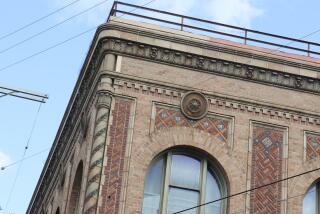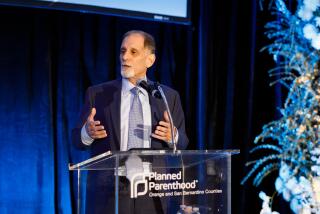Zen center is suing Walnut, alleging religious discrimination
- Share via
Occasionally they would knock on a neighbor’s door to borrow tools or ask for help with a maintenance issue. But for the most part, the Buddhist nuns on Marcon Drive in Walnut kept to the ranch-style house where they lived and worshiped.
For 10 years, the young women with the shaved heads and long robes were accepted as part of an eclectic neighborhood of single-family homes, a middle school, a spacious public park and four churches — one Mormon, one Lutheran and two catering to Korean American Christians.
The area seemed like a good place to put down roots and grow. So the Chung Tai Zen Center — a branch of the Taiwan-based Chung Tai International Chan Buddhist Assn., which has more than 100 facilities around the world — sought to expand, envisioning a monastery more than 11 times the size of the low-slung home.
But neighbors balked, residents protested at planning commission meetings, the project was denied and the nuns eventually fled to nearby Pomona.
Now Walnut stands accused of religious discrimination, a strong charge in a predominantly Asian town where many practice Buddhism or are familiar with it.
The city faces a discrimination lawsuit filed by the Zen center seeking up to $2.5 million and also must comply with the settlement terms of a suit filed by the Justice Department, which accused the town of violating the federal religious land use act by standing in the way of the monastery.
A bedroom community of 32,000 with competitive schools, paved equestrian trails and a lush landscape, Walnut prides itself on being a family-friendly haven in the middle of the San Gabriel Valley. Twice named among the top 100 places to live by Money Magazine, its mission statement boasts it “is a place where small town values are respected and blended with contemporary ideals … and shares a sense of cultural belonging.”
In 1990, Walnut was one of the fastest-growing cities in California, known for its generously sized lots that appealed to Asian immigrants who had initially arrived in such places as Monterey Park and Alhambra.
At that time the city was about one-third Asian. Today Walnut is about 60% Asian, and more than half of that group is Chinese American. Despite that ethnic shift, the Zen center became a point of contention.
In 2001, the center began making plans to turn its three-bedroom home into a 16,000-square-foot monastery, including a 79-car parking lot on its 2.19-acre lot. The process dragged on for years, with traffic studies, revisions and consultations with city officials.
When it finally came up for a public hearing in 2007, residents were divided and crammed into City Hall. To some, it was a moment when prejudice reared its head in a town that was supposed to be better than that.
“I believe the opponents just didn’t want Buddhism in the city, because their reasons against the monastery weren’t very strong,” said Gary He, 59, who supported the center. “I can’t call it hate, but I got a very bad feeling and was uncomfortable.”
Ivy Kuan, 59, said a faction of Christians circulated petitions making dramatic claims about tour buses and incessant noise.
But Mike Lu, a Buddhist who attends a temple in Baldwin Park, said it was never a matter of religious discrimination.
“A temple in your backyard? How would you feel?” said Lu, 36, who lives in the same neighborhood as the proposed Zen center. “I would reject anything that has to do with traffic coming in because we want to keep it as quiet as possible.”
Others in the neighborhood overwhelmingly opposed the temple, pointing out that the nearby churches, school and park already generate traffic that clogs Marcon Drive.
Mayor Pro Tem Mary Su, whose family is Buddhist, said the community had always embraced the worship center and was resistant only to expansion. “That’s the character of Walnut,” she said. “Residents just don’t like a big development in their community.”
But in 2008, two things ratcheted up the discord in Walnut: The Zen center’s application was officially denied, and the planning commission granted a conditional use permit for a Catholic church three times larger than the proposed monastery and less than two miles away.
In 2010, the Justice Department filed a lawsuit alleging that Walnut had treated the Zen center’s application differently from other building proposals, ordering repeated traffic studies even after the first showed the center would have little impact. According to the suit, the city had not denied a conditional use permit for a house of worship since at least 1980.
Walnut City Atty. Michael Montgomery said that he was surprised by the legal action and that the discrimination charge rings hollow in Walnut, where both the planning commission and City Council have strong Asian representation.
But Barrett Litt, attorney for the Zen center, said the racial makeup of Walnut is irrelevant.
“They can’t say, ‘Well, since we’re mostly Asians and most Buddhists are Asians, we can’t discriminate against Buddhists,’” Litt said. “The city has to answer the question of what it actually did — they violated the religious rights of the Zen center.”
Litt said misconceptions about Buddhism were evident when one planning commissioner worried aloud that the center might recruit children from the local middle school and others wondered if it would be a tourist attraction.
The lawsuit was settled this year when the city agreed to comply with an order not to discriminate against religious institutions. The agency may monitor the situation for the next three years.
The Zen center, however, intervened in the suit in an effort to recover money paid to contractors and consultants and its own staff time. The organization says it also lost money because it bought the Pomona building before the market crash but the Walnut property sold after the housing market collapsed.
“The Zen center took a lot of time to decide whether to bring suit,” Litt said. “It’s not looking to get anything more than what it lost.”
True, the atmosphere at the Middle Land Chan Monastery in Pomona is anything but litigious. On a busy street across from a row of homes, the monastery is serene and appears deserted during the day, save for the few Buddhist nuns milling about inside the building. Curious neighbors in the predominantly Latino town say they welcomed the temple. Some said they hoped to check out the free meditation classes advertised on its outdoor banners.
The nuns have no interest in speaking about their dealings with Walnut and the lawsuit, preferring instead to smile and offer visitors water or an invitation to worship.
One of the nuns — a stout, short Taiwanese woman in glasses who would not give her name — would not say whether she felt her religion had been the victim of discrimination. The question, she said, was flawed.
“Everything we do is according to our wisdom and not to our feeling,” she said.
Nor would she comment on the differences between the Walnut and Pomona locations.
“We don’t say if something is better,” she said. “Sometimes a situation is complicated.”
More to Read
Sign up for Essential California
The most important California stories and recommendations in your inbox every morning.
You may occasionally receive promotional content from the Los Angeles Times.














